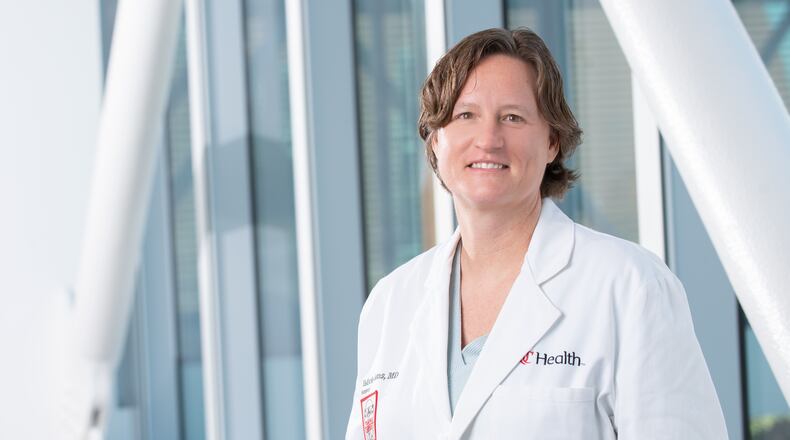For Sams, it will be just one moment in what has become an extraordinary career.
“It’s a little awkward at the moment, but it’s a really great opportunity for us to highlight what we do and highlight our Air Force involvement here,” she said in an interview with this news outlet Wednesday, her first interview with a civilian newspaper about the care she and her colleagues gave Hamlin.
Sams is assigned to the U.S. Air Force School of Aerospace Medicine while working at the University of Cincinnati Medical Center as a surgeon and director of their Center for Sustainment of Trauma and Readiness Skills, or C-STARS, program.
The Air Force school has a Fairborn address but is geographically separated, tied to medical programs and training centers across the nation, including UC.
The school is assigned to the 711th Human Performance Wing, part of the Air Force Research Laboratory, both of which are headquartered at Wright-Patterson Air Force Base.
Sams is part of a group of Air Force medics working at UC and training as part of the medical center’s Critical Care Air Transport, or CCAT, course. As part of that, she trains to care for patients who must be medically evacuated from battlefields.
“It’s like critical care in the sky,” Sams said Wednesday. “You’re bringing people home from around the world, whether it’s from combat, from just being stationed or positioned outside the United States or even across the United States.”
Sams’ team can work with the 445th Airlift Wing at Wright-Patterson, although she has not personally worked with the wing yet. She does not work at the Wright-Patterson Medical Center.
“Our leadership is all at Wright-Patterson,” Sams said. “That’s where kind of our administrative control is. We just physically work here as a geographically separated unit at the University of Cincinnati.”
Sams happened to be on call for duty Jan. 2 after Hamlin’s heart stopped during a game at Paycor Stadium. Medical staff at the game responded to the player immediately before he was transported to UC.
“We respond to all trauma activations,” she said. “I responded to the arrival, coordinated all of the care with the team to get him admitted.”
While fears were initially high, Hamlin within days was communicating with family and teammates from his Cincinnati hospital bed. He was released from the UC hospital Jan. 9 to return to New York.
“It’s very rare for people to have such a good outcome with an out-of-hospital cardiac arrest. And the reason is, it’s where they are,” Sams said. “To have that care immediately available to him on the field was crucial because of the timing. Cardio-pulmonary resuscitation or CPR is really the one thing that improves people’s chances of surviving an event like that.”
While Sams will visit Arizona, she won’t be staying for the big game.
“I’m actually on clinical service this week,” she said. “Just to go out of town for a couple of days to attend the honors event, we had to kind of scramble to find the coverage. Some of our other team members will be there as well.”
While she will receive national attention this week, Sams has already seen an eventful career. In 2019, she helped transport a soldier from Afghanistan to San Antonio, Texas in a non-stop 8,000-mile flight through a combat zone, while flying a patient whose injuries required altitude restrictions.
An Air Force account later called that flight “unprecedented.”
“I had done several of those types of missions, not anything really as long, hard or dramatic as that,” she recalled. “In that particular case, it was a combat casualty (that required) heroic measures downrange to save his life.”
About the Author


